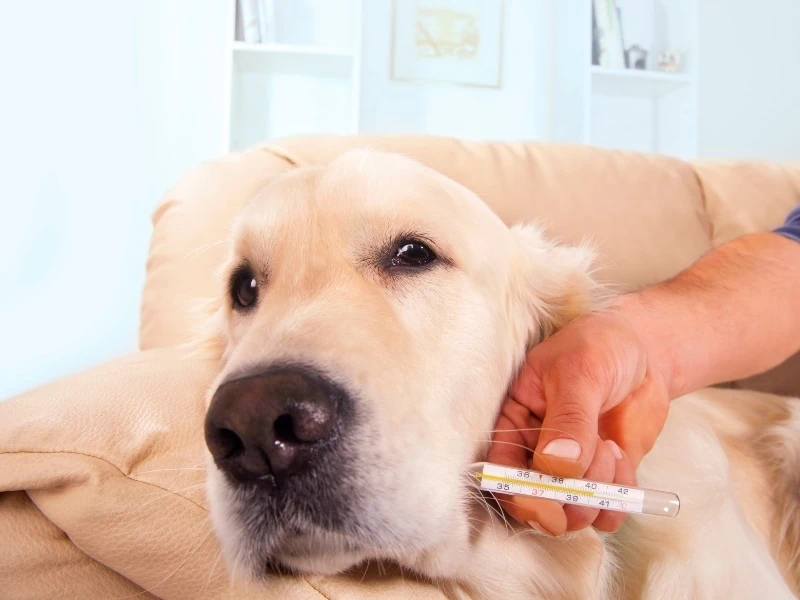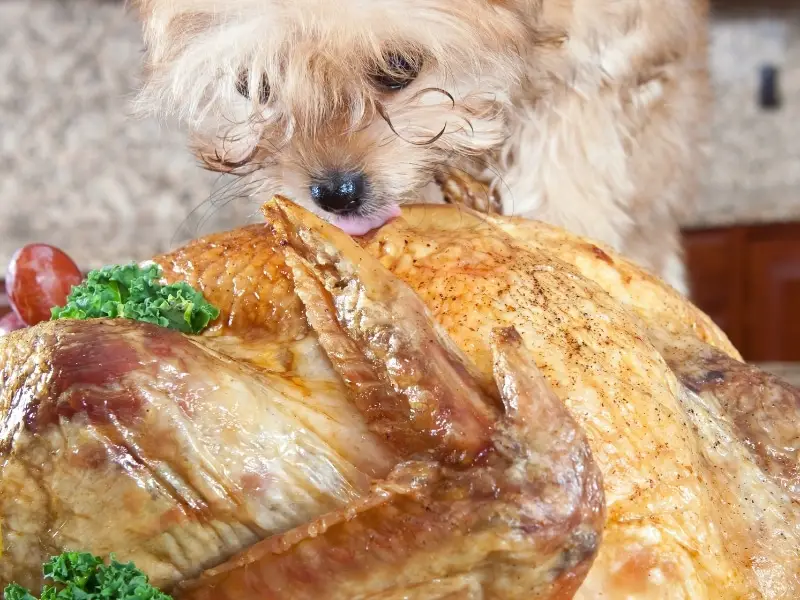While most people can’t imagine a Thanksgiving feast without roasted turkey, this delicious bird can be prepared in many different ways outside the holiday season. If your fridge is full of leftover turkey, you’re probably wondering whether you can share some of these turkey goodness with your pooch.
So, can dogs eat turkey? Yes, dogs can eat turkey meat but with a few caveats. Plainly cooked, skinless white turkey meat is safe for dogs to eat and is a great source of protein. But, Thanksgiving turkeys that are covered in butter and oil and seasoned with herbs aren’t good for dogs to eat and can cause digestive upset.
In this article, we’ll tell you everything you need to know about feeding turkey to your dog safely. Keep on reading to discover the pros and cons of turkey for dogs!
Is Turkey Good for Dogs?
When properly prepared and cooked, turkey is safe and completely healthy for dogs to eat. In fact, turkey is commonly used as the main ingredient and protein source in commercial dog foods and treats.
Cooked plain, without the skin, bones, or added oils, turkey meat can offer many benefits to your pooch. Turkey is full of protein and contains essential vitamins D, B6, and B12, and minerals including magnesium, iron, phosphorus, and potassium.
Due to its amazing nutritional value, turkey often makes the bulk of homemade dog diets and might be a good alternative if your dog isn’t a fan of chicken.
Benefits of Turkey for Dogs

As long as it isn’t seasoned, stuffed, or covered in fats and oils, dark and white meat turkey can be a great addition to your dog’s diet. Besides turkey breast, ground turkey is also perfectly healthy for your dog as long as it’s unseasoned.
The biggest benefits of feeding turkey to your dog are:
1. Turkey Is Rich in Protein
Like all meats, turkey is a great source of protein that helps keep your dog energized throughout the day. The proteins from turkey meat will also help build lean and strong muscles thus supporting your dog’s overall health.
With approximately 29 g of protein per 100 g of meat, white turkey meat is a lean source of protein with a great nutritional value.
2. Turkey Support Heart Health
Turkey meat is loaded with vitamin B6 which is one of those nutrients that your dog needs to stay healthy and thrive. Also known as pyridoxine, vitamin B6 is involved in making proteins, hormones, and neurotransmitters that carry signals between nerve cells.
Studies have found that vitamin B6 reduces blood levels of homocysteine, a chemical that’s linked with heart disease. This vitamin also reduces the chance of blood clots and helps lower blood pressure which also reduces the risk of heart disease (source).
3. Turkey Promotes Strong Bones
Turkey meat contains phosphorus and calcium which are essential minerals necessary for bone health. Both of these minerals are involved in several other functions within your dog’s body and are vital for teeth health and have major roles in blood coagulation and muscular contraction.
Risks of Feeding Turkey to Dogs

Turkey isn’t toxic to dogs, but there are a few risks you should be aware of before you start to feed your dog turkey.
The biggest downsides of feeding turkey to your dog are:
1. Choking Hazard
Plainly cooked turkey meat is safe for dogs, but cooked turkey bones can cause intestinal obstruction and pose a choking hazard (source). Like chicken, turkey has very brittle bones that can easily break and get lodged inside your dog’s throat, restricting their airflow and leading to choking.
If you decide to let your dog eat turkey meat, remove all the bones first! And if by any chance your pup manages to swallow a bone, contact your vet and observe your dog for signs of choking and intestinal blockage.
2. Extra Fat
The fat found in turkey skin, or the added oils used for cooking the turkey can cause digestive upset and lead to pancreatitis in dogs. Pancreatitis is an extremely painful and potentially life-threatening condition in which the pancreas becomes inflamed.
To prevent painful bouts of pancreatitis, only feed skinless turkey meat to your dog, and don’t add extra oils, butter, or fat to enhance the flavor.
3. Digestive Problems
The biggest problem with leftover turkey is that it’s often seasoned with salt, pepper, and herbs that can irritate your dog’s intestines and cause digestive upset. Furthermore, Thanksgiving turkeys are often stuffed with onions and garlic which are toxic to dogs when consumed in large amounts.
How Much Turkey Can a Dog Eat?
You can feed turkey to your dog safely, as long as it’s deboned, skinless, and plainly cooked. If your dog loves the taste of turkey meat you can use it as a high-value treat.
When it comes to treats, follow the 10% rule, meaning that treats should make only up to 10% of your dog’s daily calorie intake.
When it comes to human foods, such as turkey, you should always consult your veterinarian before making any changes to your dog’s diet. If your vet thinks that your dog can benefit from eating turkey, they will also tell you exactly how much your dog can eat based on their unique dietary needs.
How to Feed Turkey to Your Dog?
If you want to feed turkey to your dog, make sure that you do it safely. Steer clear from seasonings, fat, and stuffing, and opt for skinless, deboned, and plainly cooked turkey.
Popular ways to feed turkey meat to dogs are:
- Cut plainly cooked turkey breasts into bite-size pieces and feed as treats
- Mix shredded white turkey meat with your dog’s food
- Use plain turkey meat as a topper
- Make homemade dog meal using turkey meat and vegetables
- Make homemade dog treats using turkey, wheat flour, and turkey broth
Conclusion
Often used as the main ingredient in pet foods, turkey is safe for dogs to eat under certain conditions. If you want to feed turkey to your pooch, plainly cooked, skinless, and deboned white turkey meat is the best choice.
Avoid feeding bones, leftover turkey, deli meat, and other kinds of processed turkey meat since they can be harmful to your dog’s health and cause digestive problems.
Related Articles:


0 Comments